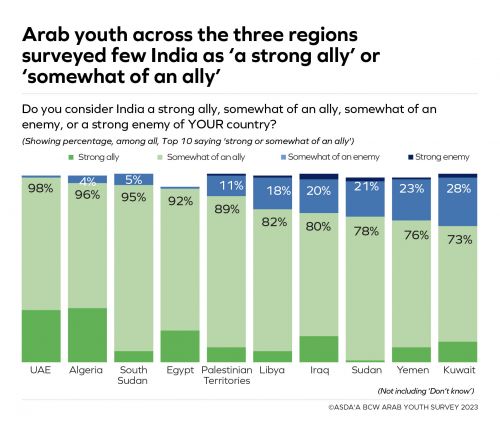- Over 98% of young UAE nationals say India is a ‘strong ally’ or ‘somewhat of an ally’
- Today, more Arab youth say India is an ally of their nation than the US
Dubai, UAE; June 20, 2023: Nearly three-quarters of Arab youth (73%) say India is a ‘strong ally’ or ‘somewhat of an ally’ of their country – one percentage point higher than the US (72%).
This is one of the key insights of the landmark 15th annual ASDA’A BCW Arab Youth Survey, unveiled today by ASDA’A BCW, the Middle East & North Africa’s leading communications consultancy. The survey is the largest study of its kind of MENA’s largest demographic, its 200 million plus youth. This year’s findings show young Arab men and women are ‘Living a New Reality’, the overarching theme of the 2023 study.

Across the three regions surveyed – the Gulf Cooperation Council (GCC) states, the Levantine countries and North Africa – India was regarded by most Arab youth as a top ally of their nation. While 98% of young UAE nationals and nearly two-thirds of young Bahrainis, Kuwaitis, Saudis and Omanis say India is an ally of their country, 84% of young Egyptians also say India is an ally. Equally strong endorsement of India as an ally was observed in the Palestinian Territories (89%), Iraq (80%), South Sudan (94%), Sudan (78%) and Libya (84%).
Sunil John, President, MENA, BCW and Founder of ASDA’A BCW, who has led the survey over the past 15 years, said: “The annual ASDA’A BCW Arab Youth Survey has proven to be an indispensable resource for global decision makers in government and business seeking a clearer understanding of a region that is increasingly influential in world affairs, yet still an enigma for many. Once again, the study sheds new light on the Arab world’s changing geopolitical landscape.”
“The rise of India as a strong ally of Arab countries reinforces the prominent role that India has played in promoting peace through cultural exchange and trade,” added John. “India and the Arab world in many ways enjoy a fraternal bond due to their geographical proximity and a shared passion for music, film and technology.”
ASDA’A BCW commissioned SixthFactor Consulting, a leading research company, to conduct face-to-face interviews with 3,600 Arab citizens aged 18 to 24 in their home nations from March 27 to April 12, 2023. The largest sample in the survey’s history was equally divided between men and women in 53 cities across a total of 18 Arab states, including for the first time South Sudan.
The interviews were deliberately conducted face to face rather than online to maximise the accuracy of the research and to reflect the nuances of Arab youth opinion across the region as much as possible.
Shifting geopolitical allegiances
Among non-Arab nations, 82% of Arab youth named Turkey as a ‘strong ally’ or ‘somewhat of an ally of their country’, followed by China (80%), the United Kingdom (79%), Germany (78%) and France (74%). The US ranked seventh (72%).
While the US is regarded less favourably than other countries, two-thirds (66%) of Arab youth surveyed said the US would be a stronger ally of their nation than Russia or China in the next five years. Russia, a top-three ally in last year’s study, now ranks in ninth place, rated as an ally by 63% of respondents, below Pakistan (69%).
Arab youth also said the US will continue to exert the most influence in the Arab world. Compared to only 3% naming Turkey as having the most influence, and 4% identifying China, a third of young Arabs (33%) say the US is the most influential, followed by the UAE (11%), Saudi Arabia and Israel (both on 10%), and Russia (8%).
However, most would like the US to be less involved in Middle Eastern affairs, with nearly two-thirds across the GCC, North Africa and the Levant countries saying they ‘strongly or somewhat support’ US disengagement from the region.
In the coming weeks, ASDA’A BCW will publish insights under the other five themes covered in the study: My Politics, revealing what young Arab say about the performance of their government; My Livelihood, detailing their views on education, jobs, and their finances; My Identity, covering religion and issues of personal identity; My Aspirations, the hopes of young Arabs for the future; and My Lifestyle, highlighting their habits, pastimes, and the media they consume.
Findings on climate change, mental health and gender rights will also be disclosed, making this year’s study the most extensive in the survey’s history. The overall theme of the 15th edition of the ASDA’A BCW Arab Youth Survey is ‘Living a New Reality’.
More insights are available in the Findings section.